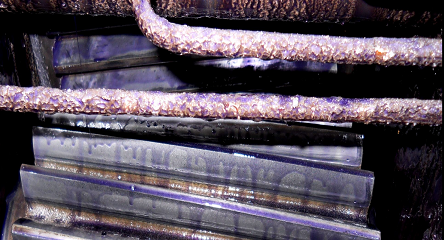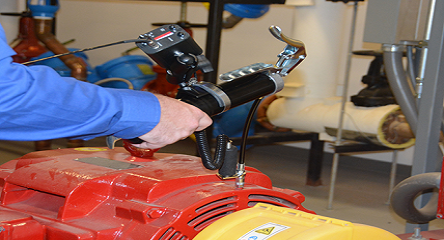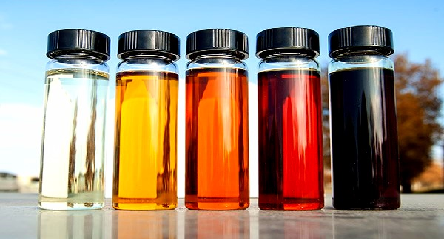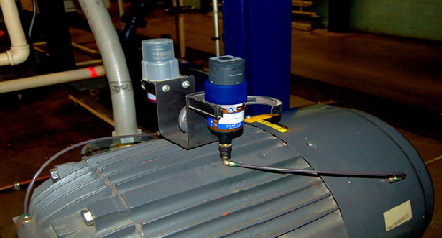Company Profile:
Basic American Foods operates five facilities throughout Idaho, California, and Washington. To serve their customer-base of restaurants, schools, grocery and club stores, hospitals, and families around the country, Basic American Foods adheres to their values of integrity and taste to remain the market leader in dried potato and bean products. This family-owned business processes over two million potatoes each day in their Blackfoot, Idaho facility where Des-Case collaborated with Basic American Foods to create a premier lube room and seal and protect eight critical assets.
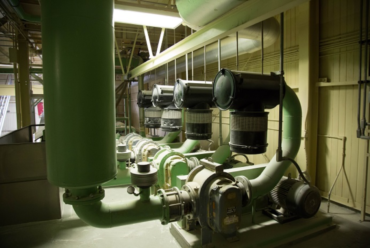
“The dollars add up when you replace a $10,000 pump every year, and we have pumps everywhere.”
— Scott Fischer, Maintenance Manager for Basic American Foods
The Challenge:
When Scott Fischer, Maintenance Manager, joined Basic American Foods, he recognized that the Blackfoot Basic American Foods plant was in need of a dedicated lubricant storage and handling process and products to support his reliability program goals. At a high level, the 70-year-old facility was losing money with monthly shutdowns and annual equipment rebuilds. His goal? “To make it all last longer, and reduce overall costs.”
Getting Leadership Buy-In
What did Basic American Foods leadership want to know before approving a lubrication program overhaul? What the investment is worth. Because reliability initiatives and programs often take months or years to prove results, they often fail or become forgotten. Utilizing metrics and case studies from comparable programs, Fisher and his colleague, Corinne Jeffs, Reliability Manager, presented reliability case studies from companies with proven ROI from their investment. “The dollars add up when you replace a $10,000 pump every year, and we have pumps everywhere.” In addition to general maintenance costs and annual replacement, Fisher explained that if a pump fails during the night, Basic American Foods was faced with significant downtime and major dollars lost. To make their pitch, Fisher and Jeffs went on a tour from executive to executive in order to prove they had the evidence to back up their request for funding and support.
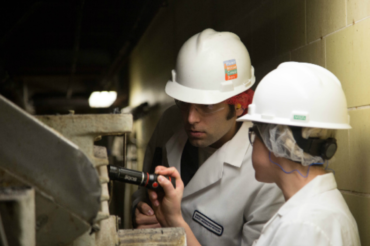
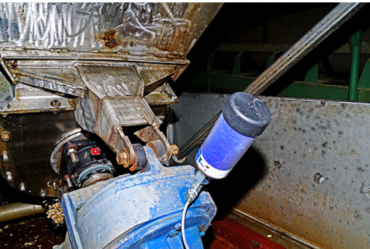
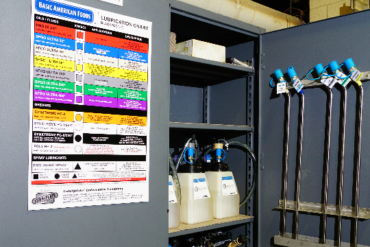 The Solution:
The Solution:
Starting with free oil analysis from their oil vendor, Fischer and Jeffs saw trouble in their oil-water, dirt, and very little oil at all. Immediately, they determined the best place to begin their improved reliability journey was to look for the right team to help them with their goals. In partnership with their supplier, Motion Industries, Des-Case was engaged to conduct a comprehensive 3-Day Lubrication Assessment of all assets within the plant. Not only would the assessment outline opportunities for lubrication improvement and help build the business case for company leadership, the Assessment and partnership with Des-Case Services team also provided an opportunity for training and support on lubrication best practices. A fully collaborative plan was developed and presented by Des-Case Services team, which scores a facility in each of the ten key areas of lubrication relative to best-in-class. Action items from an Assessment report guide customers on next steps. For Basic American Foods, those steps included selecting a centralized, accessible space for their new lube room as well as modifications to eight critical assets throughout the plant.
The lube room was fitted with state-of-the-art equipment, including several LT-Series Lubricant Management Systems (LT-LMS), several filter carts, a drum filter cart, and oil transfer containers.
Throughout the plant, modification kits were placed on the eight critical assets including gearboxes and pumps. The kits include desiccant breathers, visual oil analysis (VOA), oil sampling ports and quick connects. Using desiccant breathers ensures the equipment can breathe while protected from particulate and humidity. Des-Case visual oil analysis products provide a clear view of the health of the lubricant by providing a 360-degree method of viewing oil for cloudiness, water content, particulate and more. When oil samples are needed, whether on a routine basis or due to concerns from visual oil analysis, the oil sample ports provide a best practice method for taking a true sample. Finally, filtration and lubricant top-offs are seamless with quick connects that maintain a sealed system when connecting an off-line filter cart for filtering the oil or adding new oil to the system with oil transfer containers.
The Results:
The road to reliability is not a race, but Basic American Foods is well on their way to seeing a strong finish.
BAF’s precision lubrication program includes two critical components of a world-class precision lubrication program: filtration of new oil and in-service kidney loop filtration of critical asset reservoirs. Both have shown impressive results. After filtration with Des-Case’s LT-LMS lube storage & filtration system, the ISO code of a new drum of ISO 46 hydraulic fluid dropped from 17/15/13 to 14/13/11, becoming two times cleaner.
Using a customized Des-Case Equipment Modification Plan for BAF’s SEW Eurodrive FA107, oil samples were greatly improved after in-service kidney loop filtration with a Des-Case filter cart following a change with pre-filtered oil. Three samples taken at BAF show a progressive decrease in particle count and water ppm as filtration of new oil in storage and in-service filtration started.
The first sample with no pre-filtration or in-service filtration yielded a particle count of 24/24/19. The second sample, after adding pre-filtered oil and in-service filtration (water filter & β7 ≥1000 filter), yielded a particle count of 21/15/12. The third sample of the same oil after in-service filtration (water filter & β5 ≥1000) yielded a particle count of 19/17/13. Water content also dropped from .043% (430 ppm) to .004%. (40 ppm) between the first and third sample.
This data shows the value of both filtration of new oil as well as in-service filtration when working to achieve target particulate counts and water concentration (ppm) for specific equipment. As exhibited in BAF’s first two samples, pre-filtration of new lubricant will not independently lower ISO particulate codes and water concentrations (ppm) to target codes. New oil added to a worn and dirty gearbox is better than the alternative, but significant change occurs when the new, pre-filtered oil is also filtered while in service.
“Every time they see the space and what we are doing they tell us they haven’t seen anything like it before.”
Fischer and Jeffs have also seen positive changes from their maintenance and reliability team as well. Team-wide, some long-time employees were initially hesitant to the implemented changes, but have seen that color-coding and the new equipment has made their jobs easier. “Now everyone is on board and the team is very protective over their new tools,” says Fischer. With LT-LMS storage containers and best practice oil transfer containers, the lubricants are protected from contaminants in the environment. “With enough filter carts in place, even the hardest to reach applications are filtered with ease.” With training and practice, employees now have a better understanding of the lubricants and how they affect the equipment. “There’s a better understanding of things like appropriate viscosity for each application, and the importance of color-coding all the way to the gearbox.”
In addition to the team and leadership at Basic American Foods, customers and the FDA have noticed the positive results. Each time a customer or FDA audit takes place, Fischer and Jeffs make sure the lube room is on the tour. They are able to demonstrate the proper management of food-grade and nonfood grade oils, and how Basic American Foods is preventing cross-contamination. “Every time they see the space and what we are doing they tell us they haven’t seen anything like it before,” says Fischer. “They are really impressed with our lubricant management all the way through.”
To tie everything together, and encourage program protocol, Basic American Foods also implemented a color-coding system to ensure the clean and dry lubricants made it into the right place and the right time, without contamination. All X lubricants stored in the lube room in LT-LMS bulk storage can be transferred safely to oil transfer container and directly into the right asset following the color code maps posted throughout the facility. Dedicated drum adapter kits, filter carts, and quick connects prevent cross-contamination during filtering, too. As a food processing facility, this strict protocol is one way Basic American Foods meets Food and Drug Administration (FDA) regulations. Not only are they ensuring food-grade lubricants remain separate from any others, but their entire lubrication program is clear and simple to follow.
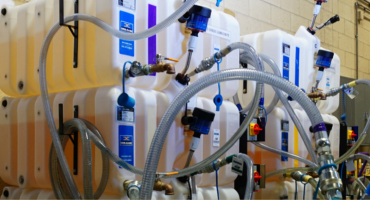




 The Solution:
The Solution:


